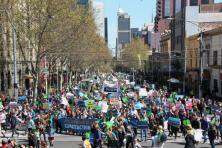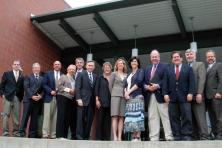City leaders across the United States see that energy efficiency means not only carbon reduction but also good government and sound economic policy:
- Boston won top marks again from the American Council for an Energy-Efficient Economy (ACEEE) for its strong energy policies and initiatives, including a requirement that large buildings report energy and water use, as well as a partnership with utilities to reduce electricity demand by 200 MW by 2017. New York City, Washington, DC, San Francisco, and Seattle rounded out the top five in the ACEEE’s second annual city energy scorecard.
- On June 4, Kansas City, MO became the 14th city in the U.S. to require that major property managers report energy and water consumption. City councilmembers cited energy savings, environmental protection, and job creation as reasons for supporting the ordinance.
- Redmond, WA budgeted $820,000 to reduce its operational energy consumption and carbon footprint, and Bellevue, WA is kicking off energy efficiency initiatives for both commercial and residential buildings.
Two proof points that building efficiency is smart business:
- Real estate investment trusts that include sustainable buildings have superior financial performance, according to the Carbon War Room and the University of Cambridge.
- Green leasing—adding clauses to existing building contracts to promote energy-efficient tenant behaviors—can save the nationwide office market $3 billion annually, according to the Institute for Market Transformation (IMT). Seattle’s Bullitt Center is among the pioneers of green leasing, and a number of companies are implementing green leases nationally.
Now leaders of the home real estate industry are working on how to value energy efficiency more thoroughly in home sales. On May 28, the Council of Multiple Listing Services, the Appraisal Institute, and other key stakeholder groups announced a partnership with the US Department of Energy to expand the use of home energy data in real estate transactions.
Rooftop by Rooftop
“Why aren’t more cities covered in solar?” asks the Institute for Local Self-Reliance (ILSR), noting that medium-sized cities could install upwards of 5,000 MW of solar on municipal buildings and land. Yes, barriers exist, but the solar leadership of diverse communities such as Lancaster, CA, New Bedford, MA, Denver, CO, Kansas City, MO, Raleigh, NC, and Dubuque, IA shows that obstacles are surmountable.
As for utility collaboration—a commonly cited challenge for city energy innovation—all eyes are on the Minneapolis Clean Energy Partnership, a nascent initiative that the city brokered with its utility Xcel and CenterPoint Energy to deliver energy efficiency, energy choices, and renewable energy, in direct support of the city’s climate and energy plans. ILSR expressed healthy skepticism about the lack of quantitative goals and accountability in the partnership’s work plan. We will watch closely to see how this plays out.
Boulder, CO, another Xcel customer, continues to pioneer how to deliver low-carbon energy as a municipal utility (albeit with Xcel powering the city during its transition). One pressing question: how will the pressure from Boulder and Minneapolis affect Xcel’s energy plans, and other utilities’ appetite for community partnership?
Gold Stars
The San Diego Regional Climate Collaborative won a Climate Leadership Award from the U.S. Environmental Protection Agency (EPA) for its innovative partnership of local governments, businesses, academia, nonprofits, and philanthropic entities to reduce greenhouse gas emissions and prepare for climate change impacts. (The 2016 Climate Leadership Award application period is open through September 25, 2015.)
West Coast cities topped Clean Edge’s fourth annual Metro Clean Tech Leadership Index, which ranked U.S. metropolitan areas based on their advancement of green buildings, clean transportation, renewable electricity, and clean tech investment. San Francisco (1), San Jose (2), Portland (3), San Diego (4), Los Angeles (6), and Seattle (7) fronted the pack.
Resources and Upcoming Events
- The EPA released a valuable series of guides and tip sheets on how to implement climate and energy programs. We recommend you check them out.
- The King County Sustainable Cities Roundtable will feature an expert discussion of solar adoption campaigns and streamlined solar permitting on July 9 at the Mercer Island Community and Event Center.
- Drive Oregon will host EV Roadmap 8, a national electric vehicle conference, at the World Trade Center in Portland on July 29 and 30.





